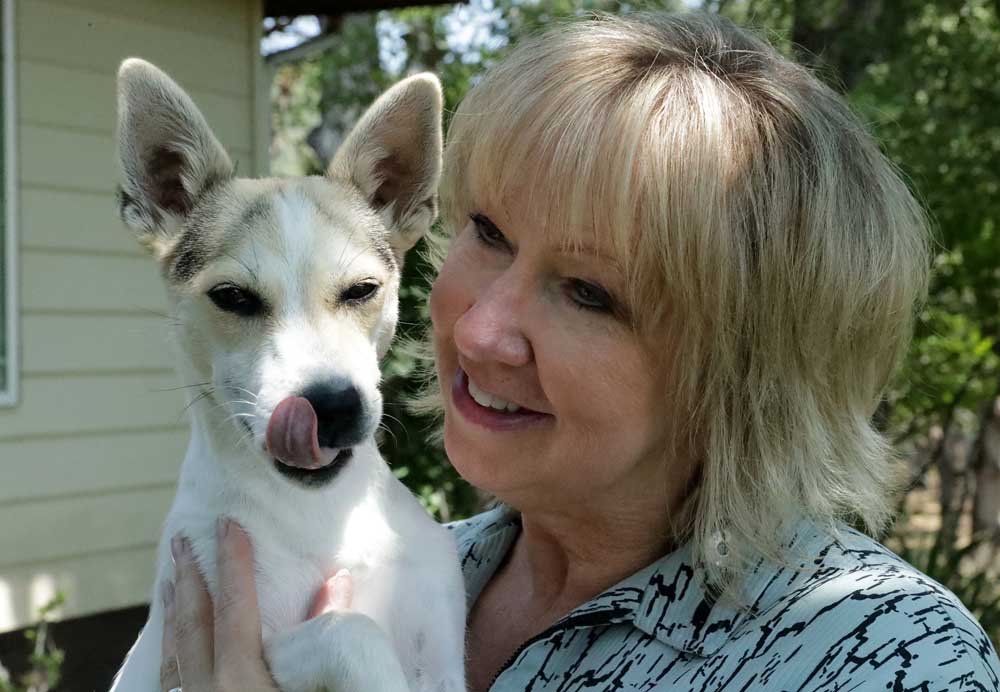THC poisoning in dogs becoming common, local vets say
Published 5:00 pm Friday, June 30, 2023

- Tammy Noble with her dog Mazie at her Sams Valley home. Mazie likely ingested THC June 23 at the Bear Creek Park dog park and required emergency veterinary assistance.
Of all the issues to worry about with a new puppy to care for, Sams Valley resident Tammy Noble said she never thought about marijuana poisoning.
Trending
When she visited the Bear Creek Park dog park last Friday with friends, Noble said her 6-month-old terrier mix named Mazie turned suddenly unwell.
Within hours, Noble got a crash course in dealing with an extremely stoned pooch.
“We had played and had a great time, and everything seemed well, until afterward. She was sitting upright, and her head started bobbing. I thought, well, that was a little weird, but my first thought was, I wonder if she didn’t drink enough water and got overheated?” Noble recalled.
Trending
“She started drooling and her eyes started glazing over. By the time we got her in the car, her eyes started rolling in the back of her head. If I tried to pet her to comfort her, she was just really scared and was crying.”
Noble took the pup home for a cool bath and to keep an eye on her. When Mazie started falling over and couldn’t sit up, Noble called the Southern Oregon Veterinary Specialty Clinic in Central Point.
“As soon as we got there, they seemed to know what had happened right away. They said, ‘It looks like she’s ingested some marijuana.’ It surprised me, They said, ‘this is very, very common.’”
By the time Mazie was examined, she was struggling to walk, vomiting, dribbling urine and had respiratory depression.
Not only did Noble learn how common THC poisoning has become in dogs — the ASPCA’s Poison Control Center reported a 765% increase from 2009-2019 — she’s since had a number of friends and acquaintances report similar instances.
Dr. Jamie Arvizo, lead emergency veterinarian for SOVSC, said it “would be a rare day” if her facility didn’t treat multiple dogs for THC ingestion during any given shift.
With marijuana being legal in Oregon, dogs get ahold of THC-containing products in homes — via edibles or joints — but also in green spaces around the city from an unexpected culprit — dogs can ingest THC by eating human waste.
“It’s a major thing for sure. We see it every shift, and the symptoms are pretty classic. My last 12-hour shift, I saw three THC ingestion patients in a row,” Arvizo said.
“People that don’t have it in their home, they don’t understand where their dogs are getting it. I tell clients that dogs just seem to find it in any form. Even if people don’t have it in their home environment … it could be a bud or a plant or gummy or anything. They eat it and become ataxic, which presents as a drunken walk.”
Arvizo said symptoms range from extreme sleepiness and anxiousness to urinary incontinence and, in worst case scenarios, even slipping into a coma.
“Most people will notice their dogs have been napping and they’re hard to wake up. Their heads are wobbling, kind of like a bobblehead dog. Or they’re flinching and kind of afraid,” she added.
“It really ranges from very mild, where the dogs will have symptoms but still able to walk, to the extreme side. If dogs get into something that is very concentrated, like the oils or butters, they can become comatose, where they’re really out of it for a long time.”
Carolyn Terry, an accountant for a tax office near Hawthorne Park in Medford, is a recently schooled dog owner.
Terry’s year-old lab, Daisy, got THC poisoning this spring.
Terry said she brings Daisy to work every day and takes the pup for walks through the neighborhoods around Hawthorne Park.
“The day she got sick, we had walked up to Roosevelt School, through the residential stuff. We came back and, within a couple hours, she was acting super tired. I just thought, well, we went on a pretty long walk,” Terry said.
“As the afternoon went on, she looked more and more tired. My husband picked her up at 4 o’clock and she wasn’t acting like her normal self. My husband actually had to carry her into the house. She didn’t want to eat, and then her eyes started rolling back into her head. It was really scary.”
Terry said her veterinarian took “one look at Daisy and knew exactly what it was.”
“The vet tech took one look at her eyes and asked if there was any possibility of THC exposure. She said she could do a test, but she said, ‘Look at her eyes, she’s higher than a kite. She just needs to sleep it off.’”
— Carolyn Terry, accountant and dog owner
“The vet tech took one look at her eyes and asked if there was any possibility of THC exposure. She said she could do a test, but she said, ‘Look at her eyes, she’s higher than a kite. She just needs to sleep it off.’”
Terry said was surprised to learn that Daisy could have picked up anything from a joint to an edible or even a pile of human feces.
“I said, ‘But she’s not wanting to eat.’ Apparently, dogs don’t get munchies like we do,” she added.
“I took her on a walk, so of course I had to rip three things out of her mouth during one walk. She’s a lab. Everything must be tasted.”
Arvizo said THC poisoning is rarely life-threatening but should still be taken seriously.
“Dogs can become comatose, where they’re really out of it for a long time. In those cases, we’ll recommend hospitalization,” she said.
“The majority, thankfully, are in that mild range where I can just let people know that their dogs are stoned and that they’ll be able to sleep it off. It looks super scary and can make them feel pretty sick, but it doesn’t cause organ damage.”
Arvizo warned that dogs won’t remember their ordeal well enough to avoid a repeat incident.
“Usually, thankfully, we can be laughing about it all by the end because their dogs end up being OK,” she added.
“But I do tell clients, your dog did not learn a lesson here, so you need to make sure that if it’s in the environment, put it somewhere they can’t get to it.”
“Like I said, it would be a rare day if we did not see a dog that had ingested THC in our hospital. But the silver lining is, they’re gonna be OK.”









